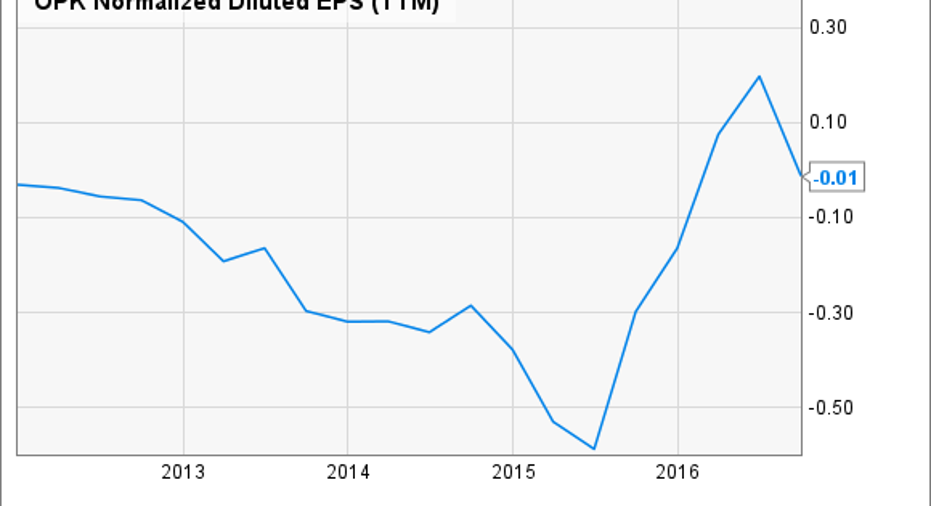Opko Health: Rayaldee Makes This Stock Worth Watching

The FDA gaveOpko Health's(NASDAQ: OPK)kidney-disease drug Rayaldee a green light in June and the company is officially launching it this week. Rayaldee revenue could be substantial because current treatments used to boost vitamin D in patients with chronic kidney disease are arguably lacking. However,it may be a while before investors know for sure how big of a needle mover this drug will be for the company.
Image source: Getty Images.
Changing treatment
Rayaldee is approved to treat secondary hyperparathyroidism (SHPT) caused by vitamin D insufficiencyin patients who are diagnosed with stage 3 or stage 4 chronic kidney disease, or CKD.
SHPT occurs when vitamin D insufficiency leads to excessive amounts of parathyroid hormone being secreted, which, if left unchecked, can result in calcium and phosphorous being released from bone. SHPT can cause the calcification of vascular tissue and kidney tissue, which is life threatening, as well as weaker bones. Up to 60% of the 9 million CKD stage 3 and stage 4 patients can suffer vitamin D insufficiency.
Prior to Rayaldee's launch, doctors have addressed vitamin D insufficiency by prescribing vitamin D supplements, drugs that improve calcium absorption like Drisdol, or other SHPT medicines such as Sanofi's Hectorol, which generated about $40 million in quarterly sales prior to losing patent protection.
While these approaches can be effective, they can also deliver mixed results. Vitamin D supplements, for example, can increase vitamin D and decrease plasma intact parathyroid hormone (iPTH), but the change is limited. Similarly, Hectorol can significantly decrease iPTH, but it can decrease vitamin D and increase calcium levels in the bloodstream.
Source: Opko Health.
Rayaldee's ability to significantly increase calcium, significantly decrease iPTH without impacting calcium, gives it a best-in-class advantage that could potentially make Rayaldee a standard of care in these patients.
In announcing Rayaldee's launch, Opko Health's CEO Philip Frost opined that, "Based on the highly positive reception of Rayaldee by nephrologists attending the recent ASN meeting, we believe that Rayaldee will become a mainstay in the armamentarium of treatment options available for kidney disease patients."
Certainly, Rayaldee's efficacy in clinical studies seems to support that optimism. In trials, Rayaldee patients saw more than a 30% reduction inplasma iPTH compared to placebo, and Vitamin D sufficiency was achieved in more than 80% of patients, which was far better than the 7% achieved in the placebo arm of the study.
Turning a profit
If Rayaldee establishes itself as a go-to drug in this indication, then its sales could eclipse those previously achieved by Hectorol. In the past,Opko Health has said that Rayaldee's addressable market values out at $12 billion. Theoretically, it wouldn't take much market share for this drug to become a nine-figure seller.
Rayaldee's sales potential could go a long way toward helping Opko Health turn the corner from losses to profitability. Frost's highly acquisitive nature and a flurry of costly clinical trials has led to Opko Health delivering significant losses over the past five years.
OPK Normalized Diluted EPS (TTM) data by YCharts.
Industry watchers are increasingly hopeful, however, that Opko Health's string of losses is coming to an end. Currently, they're predicting the company will go from losing $0.08 per share on $1.25 billion in sales this year to breaking even on $1.45 billion in sales next year.
Rayaldee could be a big driver of that improvement, but Opko Health's improving financial condition will also be helped by ongoing demand for specialty lab services offered by the company's Bio-Reference Labs. The company could also collect more meaningful royalty revenue from Tesaro next year. Tesaro licensed Varubi from Opko Health in 2010 and it'sdeveloping an intravenous formulation of the chemotherapy-induced nausea and vomiting drug. If successful, it could compete more effectively againstMerck & Co.'s competing drug Emend. which hauled in $535 million last year.
Opko Health's top and bottom line could also get a boost if phase 3 trials of its long-lasting human growth hormone, hGH-CTP, pan out. Data is expected soon, and if its good, then the company could earn milestone and royalty revenue from Pfizer, its partner on the drug.
Looking forward
Rayaldee's success depends on educating nephrologists about its advantages over other long-standing treatment options. Convincing these doctors to prescribe Rayaldee could be slow-going, and if so, then Rayaldee's sales trajectory could be more of a slow climb than a rapid ascent. For that reason, investors will want to keep close tabs on Opko Health's quarterly results next year. If Rayaldee's revenue is strong out of the gate, then it could make this stock one to own in 2017.
10 stocks we like better than Opko Health When investing geniuses David and Tom Gardner have a stock tip, it can pay to listen. After all, the newsletter they have run for over a decade, Motley Fool Stock Advisor, has tripled the market.*
David and Tom just revealed what they believe are the 10 best stocks for investors to buy right now... and Opko Health wasn't one of them! That's right -- they think these 10 stocks are even better buys.
Click here to learn about these picks!
*Stock Advisor returns as of November 7, 2016
Todd Campbellhas no position in any stocks mentioned.Todd owns E.B. Capital Markets, LLC. E.B. Capital's clients may have positions in the companies mentioned.Like this article? Follow him onTwitter where he goes by the handle@ebcapitalto see more articles like this.The Motley Fool has no position in any of the stocks mentioned. Try any of our Foolish newsletter services free for 30 days. We Fools may not all hold the same opinions, but we all believe that considering a diverse range of insights makes us better investors. The Motley Fool has a disclosure policy.



















